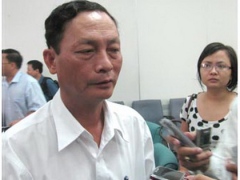Massive losses cost EVN chairman his seat
>> Official denies power price rises to subsidise EVN losses
Besides EVN Telecom, which was forced to accept acquisition by the military-run Viettel Group to avoid insolvency, EVN also incurred enormous losses from other investments in non-core businesses, said Vu Duc Dam, head of the Government Office.
By the end of 2010, EVN sank a total of VND2.44 trillion ($117.1 million) in investments into EVN Telecom, while also covering expenses of more than VND1 trillion to supply terminal devices for the telecom operation.
During the initial stages of entering the telecom industry, EVN received warnings from industry insiders that telecom is a non-core sector to the power enterprise. However, EVN executives claimed that it could make use of the already existing infrastructure of power poles and wires for telecom development.
Moreover, they said, with the advanced 3G technology, EVN Telecom would be able to compete successfully against other rivals in the industry.
However, since EVN Telecom could not afford to offer promotional campaigns to attract subscribers like its Viettel, Vinaphone and MobiFone rivals, it soon drowned, unable to withstand the competition of the industry.
With the number of subscribers dramatically slumping, EVN officially declared the failure of EVN Telecom at the end of 2010, when Hung admitted that the telecom had been incurring a monthly loss of dozens of billions of dong.
Haphazard investment
Under Hung’s regime, EVN has sunk thousands of billions of dong in investments in many other non-core sectors such as securities, banking, and real estate, while the power industry faced a capital shortage for power production.
By the end of 2010, EVN’s total non-core investment topped VND50 trillion ($2.4 billion), nearly 90 per cent of which was accounted for by EVN’s affiliates and subsidiaries.
However, such a huge investment would only yield profits worth a mere VND540 billion, or a return-on-equity ratio of only 1 per cent.
EVN also had a total investment of VND2.1 trillion in four other “sensitive” sectors, including real estate, insurance, banking, and finance, accounting for 3.27 per cent of its equity.
According to audit results of EVN in 2010, the state-run enterprise suffered a total loss of VND8.41 trillion, while the figure in 2011 was nearly VND17 trillion.
Last October, the Government Office ordered that the Ministry of Finance and the Ministry of Industry and Trade conduct check-ups of EVN’s power pricing scheme, and its investment in the non-core businesses, especially the securities, banking and insurance sectors.
The Ministry of Industry and Trade should order EVN to provide discipline and other sanctions on relevant agencies and individuals, the Prime Minister ordered.
What the stars mean:
★ Poor ★ ★ Promising ★★★ Good ★★★★ Very good ★★★★★ Exceptional
Related Contents
Latest News
More News
- Foreign fruits flood Vietnamese market (December 09, 2025 | 13:22)
- Vietnam’s fruit and vegetable exports reach $7.8 billion in first 11 months (December 05, 2025 | 13:50)
- Vietnam shapes next-generation carbon market (November 26, 2025 | 15:33)
- PM urges Ho Chi Minh City to innovate and remain Vietnam’s economic locomotive (November 26, 2025 | 15:29)
- Experts chart Vietnam's digital finance path: high hopes, high stakes (November 14, 2025 | 10:56)
- Vietnam’s seafood imports surge 30 per cent in first 10 months (November 10, 2025 | 19:35)
- Vietnam’s durian exports hit $1 billion milestone (October 30, 2025 | 17:41)
- Beyond borders: Sunhouse and new era of Vietnamese brands on Amazon (October 28, 2025 | 10:46)
- Record-breaking trade fair set to open in Hanoi (October 15, 2025 | 15:59)
- Timber sector seeks solutions to VAT refunds (October 14, 2025 | 18:58)


 Tag:
Tag:




















 Mobile Version
Mobile Version